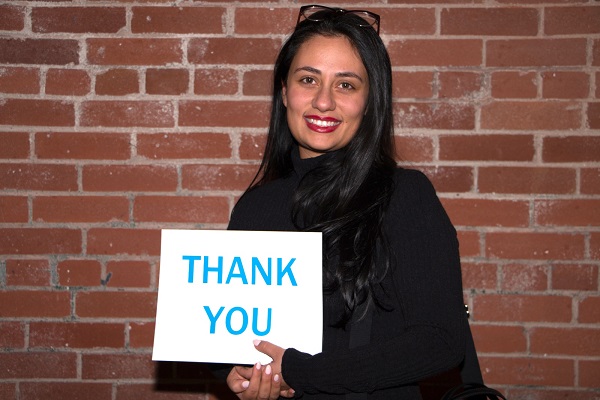Ontario Tech celebrates graduate student recipients of donor awards
April 3, 2019

Graduate students pursuing master’s and PhD degrees in research-based programs at Ontario Tech University have various funding opportunities available to them. Full-time graduate students in research programs may become Teaching Assistants or Research Assistants at the university. High-achieving students may also apply for external awards from provincial and federal granting agencies. International students often have similar opportunities for awards from their home countries.
Donor awards are another avenue for funding. These awards represent an investment from esteemed donors in the community. Donor funding allows students in the university’s School of Graduate and Postdoctoral Studies to access innovative learning opportunities, alleviate the financial costs of their education and pursue their research goals.
On April 2, this year’s award recipients had the opportunity to thank their award donors in person at the Donor Appreciation Reception. The reception is also a valuable opportunity for graduate students to share more about their research and career ambitions.
- Related link: Information about SGPS Donor Awards
2019 recipients, programs and faculties
|
Award |
Value per award |
Recipient |
Program |
Faculty |
|
Carol Gifford Graduate Award in Education |
$7,500 |
Melissa Bishop |
Master of Arts in Education |
Faculty of Education |
|
Lindsay Groat |
PhD in Forensic Psychology |
Faculty of Social Science and Humanities |
||
|
Hubert H. Harshman Award |
$4,800 |
Loredana Iazzi |
Master of Education |
Faculty of Education |
|
Nathan and Marvin Goldman/Durham Homes Graduate Award |
$6,250 |
Dylan Bender |
Master of Applied Science in Mechanical Engineering |
Faculty of Engineering and Applied Science |
|
William Oishi |
Master of Applied Science in Mechanical Engineering |
Faculty of Engineering and Applied Science |
||
|
Power Workers’ Union Transportation Electrification and Smart Grid Research Graduate Award |
$5,000 |
Jaya Sai Praneeth AV |
PhD in Electrical and Computer Engineering |
Faculty of Engineering and Applied Science |
|
Rizwan Ayub |
Master of Applied Science in Electrical and Computer Engineering |
Faculty of Engineering and Applied Science |
||
|
Bishoy Basta |
Master of Applied Science in Electrical and Computer Engineering |
Faculty of Engineering and Applied Science |
||
|
Sarah Frith Memorial Excellence in Health Sciences Graduate Award |
$6,250 |
Daniel Abdel-Malek |
Master of Health Sciences |
Faculty of Health Sciences |
|
Leanne Elliott |
Master of Health Sciences |
Faculty of Health Sciences |
||
|
Zilinsky Graduate Scholarship |
$2,500 |
Luxshan Ambigaibagan |
Master of Arts in Education |
Faculty of Education |
|
Mikaeli Cavell |
Master of Health Sciences |
Faculty of Health Sciences |
||
|
Leanne Elliott |
Master of Health Sciences |
Faculty of Health Sciences |
||
|
Jennifer Robb |
Master of Arts in Education |
Faculty of Education |
Quotes
“My studies during my master’s program have helped me improve my research skills and writing abilities. I hope to use these skills, and continue to improve upon them, as a research student at the PhD level. Eventually I hope to become a university professor.”
– Leanne Elliott, Master of Health Sciences student
“Working in educational contexts with marginalized communities throughout my career led me to take a more in-depth approach to language and cultural learning, specifically with Indigenous communities. I feel that researching First Nation, Métis and Inuit Elders, and understanding how they are leveraging technology to revitalize their languages in their home communities, can facilitate conversations with other communities looking to revive endangered languages. Providing context for what was successful and what needs more work can support Indigenous communities early in their language-revitalization journey.”
– Melissa Bishop, Master of Arts in Education student
“The thing I enjoy most about my research program is having the opportunity to work with so many different people in different capacities. In just over a year, I’ve already worked with more than 100 teachers, and nearly 1,000 students and education stakeholders at all levels (including government) to build STEAM (science, technology, engineering, arts and mathematics) comfort and capacity, explore different tools and technologies, and advocate for hands-on, constructionist learning.”
– Jennifer Robb, Master of Arts in Education student
“Working with children with disabilities in the midst of the current disparity of opportunity in sport and physical activity makes the urgency of research production important. The biggest challenge is quickly making an impact to improve the state of equality in sport among children with disabilities.”
– Mikaeli Cavell, Master of Health Sciences student
“I want to continue a career in research and academia, and this program will help me build the foundation I need to reach that goal. Not only have I been fortunate enough to work with highly talented research colleagues, but I have also had the help of many teaching mentors on the way. I know that no matter where I am in completing my degree, or at any stage in my future career, I will have a support network created during my time in this program.”
– Lindsay Groat, PhD in Forensic Psychology student



